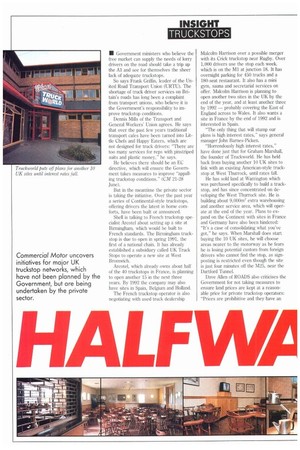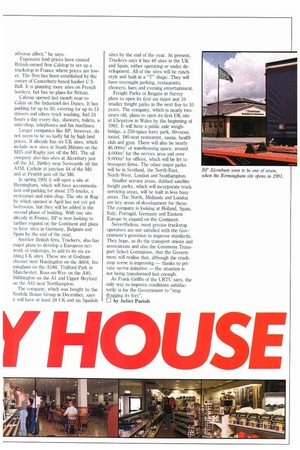• Government ministers who believe the free market can supply
Page 50

Page 51

If you've noticed an error in this article please click here to report it so we can fix it.
the needs of lorry drivers on the road should take a trip up the Al and see for themselves the sheer lack of adequate truckstops.
So says Frank Griffin, leader of the United Road Transport Union (URTU). The shortage of truck driver services on Britain's roads has long been a complaint from transport unions, who believe it is the Government's responsibility to improve truckstop conditions.
Dennis Mills of the Transport and General Workers' Union agrees. He says that over the past few years traditional transport cafes have been turned into Little Chefs and Happy Eaters, which are not designed for truck drivers: "There are too many services for reps with pinstriped suits and plastic money," he says.
He believes there should be an EC directive, which will ensure the Government takes measures to improve "appalling truckstop conditions." (CM 21-28 June).
But in the meantime the private sector is taking the initiative. Over the past year a series of Continental-style truckstops, offering drivers the latest in home comforts, have been built or announced.
Shell is talking to French truckstop specialist Arcotel about setting up a site at Birmingham, which would be built to French standards. The Birmingham truckstop is due to open in spring 1991, the first of a national chain. It has already established a subsidiary called UK Truck Stops to operate a new site at West Bromwich.
Arcotel, which already owns about half of the 40 truckstops in France, is planning to open another 15 in the next three years. By 1992 the company may also have sites in Spain, Belgium and Holland.
The French truckstop operator is also negotiating with used truck dealership Malcolm Harrison over a possible merger with its Crick truckstop near Rugby. Over 1,000 drivers use the stop each week. which is on the M1 at junction 18. It has overnight parking for 450 trucks and a 180-seat restaurant. It also has a mini gym, sauna and secretarial services on offer. Malcolm Harrison is planning to open another two sites in the UK by the end of the year, and at least another three by 1992 — probably covering the East of England across to Wales. It also wants a site in France by the end of 1992 and is interested in Spain.
"The only thing that will stump our plans is high interest rates," says general manager John Barnes-Picken.
"Horrendously high interest rates," have done just that for Graham Marshall, the founder of Truckworld. He has held back from buying another 10 UK sites to link with an existing American-style truckstop at West Thurrock, until rates fall.
He has sold land at Warrington which was purchased specifically to build a truckstop, and has since concentrated on developing the West Thurrock site. He is building about 9,000m2 extra warehousing and another service area, which will operate at the end of the year. Plans to expand on the Continent with sites in France and Germany have also been hindered: "It's a case of consolidating what you've got," he says. When Marshall does start buying the 10 UK sites, he will choose areas nearer to the motorway as he fears he is losing potential custom from foreign drivers who cannot find the stop, as signposting is restricted even though the site is just four minutes off the M25, near the Dartford Tunnel.
Dave Allen of ROADS also criticises the Government for not taking measures to ensure land prices are kept at a reasonable price for private truckstop operators: "Prices are prohibitive and they have an adverse affect," he says.
Expensive land prices have caused British-owned firm Calstop to set up a truckstop in France where prices are lower. The firm has been established by the owner of Canterbury-based haulier C S Bull. It is planning more sites on French borders, but has no plans for Britain.
Calstop opened last month near to Calais on the Industriel des Dunes. It has parking for up to 30, catering for up to 15 drivers and offers truck washing, fuel 24 hours a day every day, showers, toilets, a mini-shop, telephones and fax machines.
Larger companies like BP, however, do not seem to be so badly hit by high land prices. It already has six UK sites, which include new sites at South Mimms on the M25 and Rugby just off the Ml. The oil company also has sites at Alconbury just off the Al, I3irtley near Newcastle off the A 1M, Carlisle at junction 44 of the M6 and at Penrith just off the M6.
In spring 1991 it will open a site at Birmingham, which will have accommodation and parking for about 175 trucks, a restaurant and mini-shop. The site at Rugby which opened in April has not yet got bedrooms, but they will be added in the second phase of building. With one site already in France, BP is now looking to further expand on the Continent and plans to have sites in Germany, Belgium and Spain by the end of the year.
Another British firm, Truckers, also has major plans to develop a European network of trukstops, to add to its six existing UK sites. These are at Godmanchester near Huntingdon on the A604, Immingham on the A180, Trafford Park in Manchester, Ross-on-Wye on the A40, Stibbington on the Al and Upper Heyford on the A45 near Northampton.
The company, which was bought by the Norfolk llouse Group in December, says it will have at least 20 UK and six Spanish sites by the end of the year. At present, Truckers says it has 40 sites in the UK and Spain, either operating or under development. All of the sites will be ranch style and built in a "T" shape. They will have overnight parking, restaurants, showers, bars and evening entertainment.
Freight Parks of Reigate in Surrey plans to open its first six major and 10 smaller freight parks in the next five to 10 years. The company, which is nearly two years old, plans to open its first UK site at Chepstow in Wales by the beginning of 1992. It will have a public axle weighbridge, a 250-space lorry park, 60-room motel, 180-seat restaurant, sauna, health club and gym. There will also be nearly 46,000m2 of warehousing space, around 4,000m2 for the service area and over 9,000m2 for offices, which will be let to transport firms. The other major parks will be in Scotland, the North-East, North-West, London and Southampton.
Smaller service areas, dubbed satellite freight parks, which will incorporate truck servicing areas, will be built in less busy areas. The North, Midlands and London are key areas of development for these. The company is looking at Holland, Spain, Italy, Portugal, Germany and Eastern Europe to expand on the Continent.
Nevertheless, most private truckstop operators are not satisfied with the Government's provision to improve standards. They hope, as do the transport unions and associations and also the Commons Transport Select Committee, that the Government will realise that, although the truckstop scene is improving — thanks to private sector initiative — the situation is not being transformed fast enough.
As Frank Griffin of the uau says, the only way to improve conditions satisfactorily is for the Government to "stop dragging its feet".
El by Juliet Parish




































































































